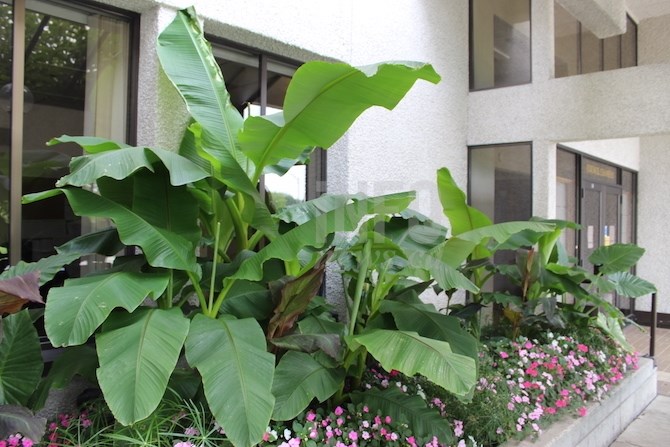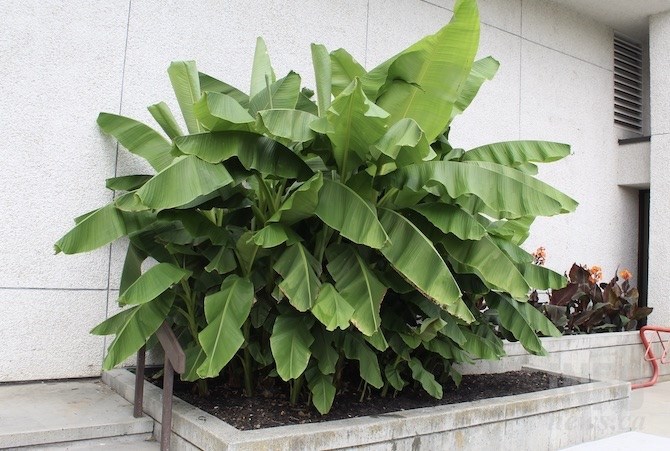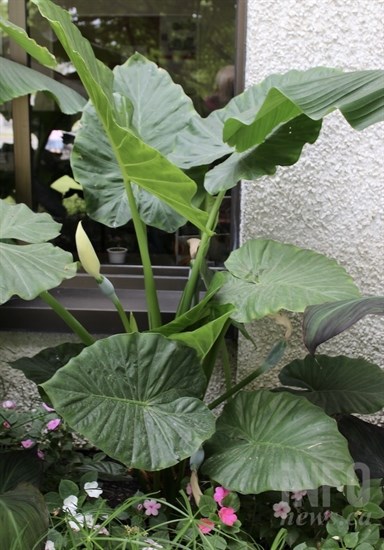
These banana trees are grown for their leaves, not their fruit, in front of Kelowna City Hall.
(ROB MUNRO / iNFOnews.ca)
August 08, 2020 - 7:30 AM
Some professionals don’t want to give away their trade secrets.
Others might use an old TV show disclaimer and say “Don’t Try This at Home.”
But City of Kelowna gardener Geoff Milan is none of those.
“I’m going to give away my secrets here,” he joked while being interviewed by iNFOnews.ca. “I don’t know if I want to do that but I’ll help people out here.”
The people who he’s willing to help is anyone who wants to follow in his footsteps and plant banana trees in their yards and are willing to take on the extra work of preparing them for overwintering.
“It’s not a lot of work for the homeowner in the fall,” Milan said as he explained how to cut the stem to about a foot above the ground, cover it with an upside down pot and bury that another foot deep in OgoGrow compost.
Homeowners, he suggested, could use the banana leaves or other leaves as mulch. The key is to insulate the roots from the coldest days of winter.
Anyone wanting to see Okanagan banana trees in real life just has to drop by City Hall on Water Street where they adorn the building from the main entrance to the south side of council chambers.
The biggest one – which will grow as tall as the building – is around back on the east side. It grows taller simply because it gets more sun.

This banana tree behind council chambers gets more sun so grows larger than the ones fronting City Hall.
(ROB MUNRO / iNFOnews.ca)
The down side to all of this is that, at the end of summer, there won’t be any bananas to eat.
“In a really good summer, it will bloom and it will produce tiny bananas that are full of seeds,” he said.
They are about the size of a finger and not why he choose to experiment with banana trees. It’s the massive display of green leaves that make them so appealing.
Malin has been a gardener with the City of Kelowna for 23 years and runs a two-person department (boosted by two casual workers in the summer).
They’re responsible for designing and building the city’s 400 hanging baskets, the flower containers at major intersections along Highway 97 and numerous flower beds throughout the city.
That includes the highly visible geranium beds between Water Street and Tugboat Beach Park that Milan says his crew has a love-hate relationship with. Its sheer size makes it a massive amount of work.
About a dozen years ago, he decided to experiment with tropical plants, just for a challenge. His bosses never objected so he’s continued on with a few tropical varieties even though they do create extra work.
It was Milan who bought four drastically discounted palm trees (about $25 each) a decade ago and planted them at Tugboat Beach. Each year they brought them indoors to overwinter.
This past winter they were too big to dig up and they had no place to put them so the palms were wrapped up and mulched. Unfortunately, while it initially looked like they all survived the winter, it may be that only one will survive.
READ MORE: Kelowna’s palm trees survived the frigid winter

Elephant Ears are in the taro family.
(ROB MUNRO / iNFOnews.ca)
The bananas, which are seven or eight years old, all seem to be thriving although this year’s growth has been slowed by the cool damp start to summer.
Unfortunately, due to vandalism, Milan is limited in the sites where he can plant them.
That’s also the case with the smaller elephant ears (Alocasia) that are also at the front of City Hall. They’re dug out each winter and, being much smaller, can be a target for thieves.
The plants are of the taro family and produce a tuber, similar to a potato.
Oh, and one more secret about growing the banana trees – uncovering them in the spring.
“You have to be careful you don’t rot them out,” Milan said.
While they can tolerate a bit of frost, too much might kill them. If that’s the case, leave them be and a “pup” may spring up off to the side.
But, if you leave them mulched for too long, the root will rot.
There’s no precise time when it’s best to do the uncovering. It’s just some the homeowner will have to figure out, just like Milan had to do with all his tropicals over the years.

(ROB MUNRO / iNFOnews.ca)
To contact a reporter for this story, email Rob Munro or call 250-808-0143 or email the editor. You can also submit photos, videos or news tips to the newsroom and be entered to win a monthly prize draw.
We welcome your comments and opinions on our stories but play nice. We won't censor or delete comments unless they contain off-topic statements or links, unnecessary vulgarity, false facts, spam or obviously fake profiles. If you have any concerns about what you see in comments, email the editor in the link above.
News from © iNFOnews, 2020